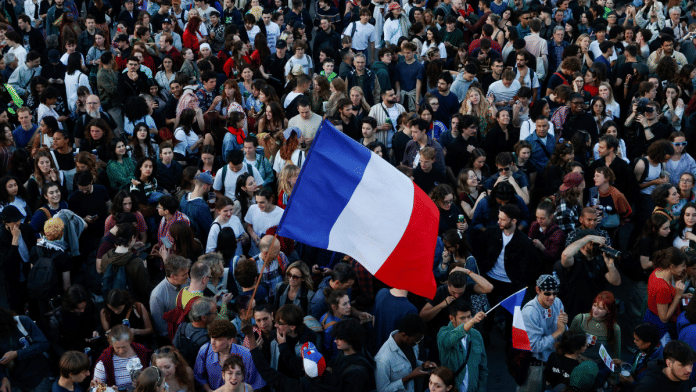New Delhi: President Emmanuel Macron’s gamble in calling a snap general election in France has plunged the country into political uncertainty as voters have thrown up a hugely fragmented National Assembly.
The Left-wing coalition won the most seats, while Macron’s Centrist bloc came second and Marine Le Pen’s Far-Right Rassemblement National (National Rally) — which was leading the polls last week — finished third. But none were anywhere near a majority.
All eyes are now on Macron, who has to appoint the next prime minister. The President is not constitutionally mandated to invite the leader of the party or coalition with the largest number of seats, but political custom demands that he do so.
After the second round of voting Sunday, the coalition of Left-wing parties that banded together as the Noveau Front Populaire (New Popular Front or NFP) led with 182 seats, while Macron’s Centrist alliance Ensemble (Together) finished second with 168. To govern with a majority, a party or alliance requires 289 seats in the 577-seat National Assembly.
The Far-Right National Rally and its allies, which had led the first round of voting on 30 June, finished third, with 143 seats — a shock result, given that the RN had surged in the European Parliament elections in June.
After his battering at the hands of the RN in the European polls, Macron took the gamble of calling early legislative elections, saying that going to the voters again would provide “clarification”. His Centrist coalition, however, was squeezed by both the Left and the Far-right, pushing France to the brink of a political paralysis.
“The President must call on the New Popular Front to govern,” said Jean-Luc Mélenchon, a Left leader, as results started pouring in. While the NFP is made up of a coalition of left-wing parties, Mélenchon heads one of its most extreme members — La France Insoumise (LFI).
Left, Centre outmanoeuvre Le Pen
The National Rally had won the highest share of votes during the first round, with about 33 percent. The NFP finished second with 28 percent, while Macron’s Together coalition won 21 percent.
The results of the first round set off worries of a Far-rRght victory in France, leading to both the NFP and Macron’s coalition withdrawing candidates tactically across the country to ensure the best non-RN candidate would win. Over 200 candidates who had finished third in the first round were pulled out of the second, .
There were celebratory scenes across Paris after the RN’s shock defeat. Nearly 60 percent of eligible voters turned out for the polls — the highest in almost four decades. Had the RN won, it would have been the first Far-Right party with a majority in France since World War 2.
Also read: Snap polls in France, shock defeat in Germany as Far Right surges in European elections
A Parliament divided
It is extremely rare to have a hung assembly in modern France, even more so one that has three distinct coalitions.
“People have taken all means to stop the French from choosing different politics. But today, the National Rally has had the best results it has ever had. Unfortunately an alliance of dishonour and electoral arrangements… Tonight these electoral arrangements have thrown France into Jean-Luc Mélenchon’s extreme Left,” said National Rally president Jordan Bardella to his supporters, after the results began pouring in.
Incumbent Prime Minister Gabriel Attal, who was appointed only in January, announced that he would offer his resignation to the president. However, he has promised to continue leading the government for as long as necessary if his resignation is refused.
Paris is hosting the 2024 Olympics, scheduled to begin at the end of this month.
Where does this leave Macron?
Some projections had suggested that Macron’s Centrist coalition would be reduced to 70 seats after the results of the first round was revealed. His party — Renaissance — remains its largest member, with about 102 seats, down from the 169 it had won in 2022.
Macron now faces the dilemma of appointing the next prime minister, though Mélenchon has already staked claim to the post. The Far-Left firebrand has also ruled out any governing arrangements with Macron’s group, while Attal is reluctant to share power with Mélenchon.
Constitutionally, Macron cannot another election for at least a year — which means the country could potentially be ungovernable for at least this time period.
How united is the Left?
Unity among various parties within the NFP, and even within Mélenchon’s LFI, is tenuous. François Ruffin, a lawmaker from the LFI, broke away from Mélenchon on Thursday, calling the leader an “obstacle” to winning votes, according to media reports.
Another member, the Socialist Party of France, is expected to emerge as the second-largest party in the bloc. The Centre-Left political party has had two candidates become President of France – François Mitterand and François Hollande. While the Socialist Party in recent years faced multiple setbacks, they doubled their number in these elections.
Hollande himself was elected to the legislature again Sunday, making him the second President to return to the National Assembly after being head of state.
(Edited by Tikli Basu)
Also read: Pezeshkian will take over as president at a critical time for Iran — a look at challenges he faces






